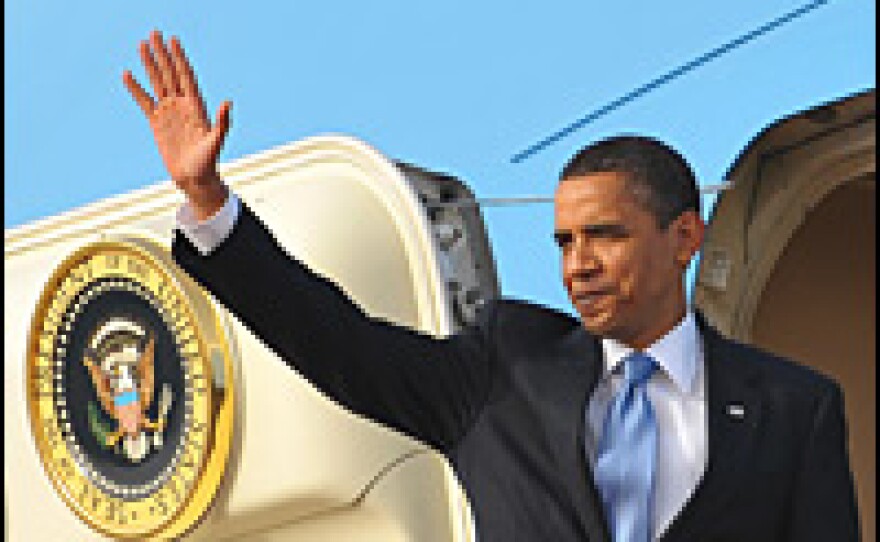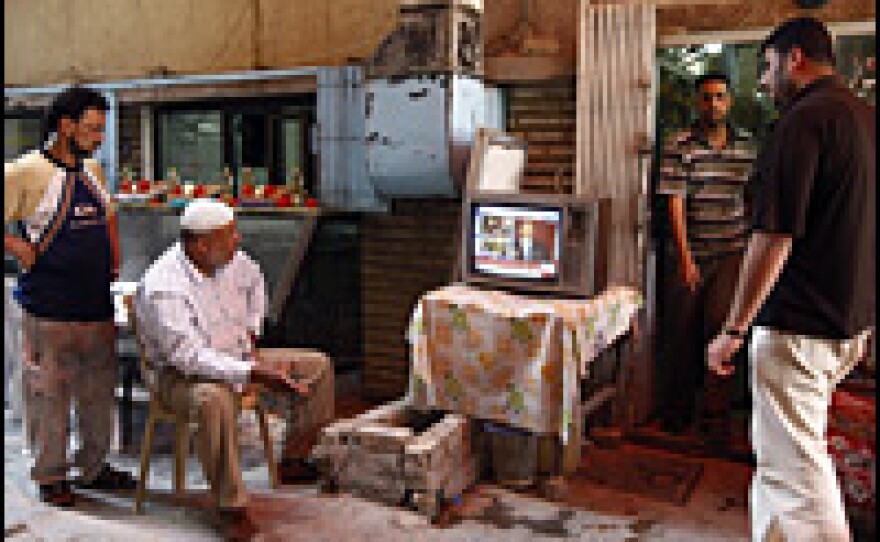

Pledging "to seek a new beginning between the United States and Muslims," President Obama reached out to the world's 1.5 billion followers of Islam on Thursday, addressing an appreciative crowd at Cairo University.
Quoting from the Quran, the Talmud and the Bible — and closing to a standing ovation — Obama said his address was an effort to "speak the truth" about U.S. relations with the Muslim world. Several times during the hour-long speech, members of the audience shouted, "We love you."
In the Middle East,initial reaction to the speech was mixed.
A Hamas spokesman dismissed Obama's remarks as "soft diplomacy" meant "to brighten the image of the United States," while a spokesman for the Palestinian Authority hailed it as "the beginning of a new American policy."
An Israeli government spokesman said he heard no major surprises, but a spokesman for the West Bank Settler's Council said the speech was "out of touch with reality ... the Muslim world is at war with the Western world."
Obama said he sought a fresh relationship "based upon mutual interest and mutual respect" and "based upon the truth that America and Islam are not exclusive, and need not be in competition."
"I am convinced that in order to move forward, we must say openly the things we hold in our hearts, and that too often are said only behind closed doors," Obama said. "There must be a sustained effort to listen to each other; to learn from each other; to respect one another; and to seek common ground."
Throughout the speech, the president touched on elements of his own life story that many analysts say are advantages in his dealings with the world beyond America's borders.
"I am a Christian, but my father came from a Kenyan family that includes generations of Muslims," he said. "As a boy, I spent several years in Indonesia and heard the call of the azaan at the break of dawn and the fall of dusk. As a young man, I worked in Chicago communities where many found dignity and peace in their Muslim faith."
The address echoed tones and themes heard during Obama's startling rise to become the first U.S. president of color — an effort that bridged divisive gaps in the American culture in a search for "common ground" and "common principles."
"Just as Muslims do not fit a crude stereotype, America is not the crude stereotype of a self-interested empire," he said. "The United States has been one of the greatest sources of progress that the world has ever known. ... We are shaped by every culture, drawn from every end of the Earth, and dedicated to a simple concept: E pluribus unum: 'Out of many, one.'"
7 'Sources Of Tension'
The speech covered seven major "sources of tension," ranging from violent extremism, the wars in Iraq and Afghanistan, the Israeli-Palestinian conflict and nuclear arms to democracy, freedom of religion, women's rights and economic opportunity.
The White House took pains to distribute the president's remarks as widely as possible. The speech will be posted on the White House Web site with links to fully translated transcripts in 13 languages.
Echoing a Cold War-era speech by President Kennedy, Obama noted that "the interests we share as human beings are far more powerful than the forces that drive us apart."
He emphasized the need for the West and Islam to work together to address mutual concerns.
"For we have learned from recent experience that when a financial system weakens in one country, prosperity is hurt everywhere. When a new flu infects one human being, all are at risk. When one nation pursues a nuclear weapon, the risk of nuclear attack rises for all nations," he said. "When violent extremists operate in one stretch of mountains, people are endangered across an ocean. And when innocents in Bosnia and Darfur are slaughtered, that is a stain on our collective conscience. That is what it means to share this world in the 21st century. That is the responsibility we have to one another as human beings."
Israel And 'Palestine'
Addressing the seemingly intractable conflict between Israelis and Palestinians, Obama vowed to pursue a peaceful outcome "with all the patience that the task requires."
He termed America's ties with Israel "unbreakable," but also pledged not to "turn our backs on the legitimate Palestinian aspiration for dignity, opportunity, and a state of their own" — and said that "just as Israel's right to exist cannot be denied, neither can Palestine's."
He called on Hamas to "put an end to violence, recognize past agreements, and recognize Israel's right to exist," saying "America will align our policies with those who pursue peace.
"Violence is a dead end," he said. "It is a sign of neither courage nor power to shoot rockets at sleeping children, or to blow up old women on a bus. That is not how moral authority is claimed; that is how it is surrendered."
He found hope in recounting America's own, long-standing problems with racial divides and applying them to the conflict in the Middle East:
"For centuries, black people in America suffered the lash of the whip as slaves and the humiliation of segregation," he said. "But it was not violence that won full and equal rights. It was a peaceful and determined insistence upon the ideals at the center of America's founding."
Iran And Nuclear Arms
Turning to the nuclear issue, Obama focused on Iran, acknowledging that "it will be hard to overcome decades of mistrust" between the two nations, but saying "my country is prepared to move forward."
Yet moving forward does not mean that Iran should pursue nuclear weapons, Obama warned:
"It is clear to all concerned that when it comes to nuclear weapons, we have reached a decisive point," he said. "This is not simply about America's interests. It is about preventing a nuclear arms race in the Middle East that could lead this region and the world down a hugely dangerous path."
At the same time, he "strongly reaffirmed America's commitment to seek a world in which no nations hold nuclear weapons ... and I am hopeful that all countries in the region can share in this goal."
Democracy And Religious Freedoms
Tackling the thorny issue of democracy in a region with deep-rooted despotic traditions, Obama said "America does not presume to know what is best for everyone."
But he added: "I do have an unyielding belief that all people yearn for certain things: the ability to speak your mind and have a say in how you are governed; confidence in the rule of law and the equal administration of justice; government that is transparent and doesn't steal from the people; the freedom to live as you choose. Those are not just American ideas, they are human rights, and that is why we will support them everywhere."
Obama appealed for Muslims to observe religious freedom.
While citing Islam's "proud tradition of tolerance," Obama criticized what he called a "disturbing tendency" among some Muslims "to measure one's own faith by the rejection of another's."
"Freedom of religion is central to the ability of peoples to live together," he said. "Indeed, faith should bring us together."
But Obama said Western countries must practice what they preach with regard to religious freedoms. He cited laws and regulations that "impede Muslim citizens from practicing religion as they see fit," such as telling Muslim women what they can or can't wear.
"We cannot disguise hostility towards any religion behind the pretence of liberalism," he said.
Women's Rights
Obama followed his entreaties for religious freedoms by urging an expansion of women's rights — noting that his concerns range far beyond nations which have Muslim majorities.
"The struggle for women's equality continues in many aspects of American life, and in countries around the world."
"I do believe that a woman who is denied an education is denied equality," he said. "And it is no coincidence that countries where women are well-educated are far more likely to be prosperous."
He said the United States will "partner with any Muslim-majority country to support expanded literacy for girls, and to help young women pursue employment through micro-financing that helps people live their dreams."
Economic Development
Going forward, such partnerships can cover many types of "economic development and opportunity," Obama said.
"Human progress cannot be denied," he said. "There need not be contradiction between development and tradition. Countries like Japan and South Korea grew their economies while maintaining distinct cultures. The same is true for the astonishing progress within Muslim-majority countries from Kuala Lumpur to Dubai. In ancient times and in our times, Muslim communities have been at the forefront of innovation and education."
Innovation and education, he said, "will be the currency of the 21st century, and in too many Muslim communities there remains underinvestment in these areas."
Obama had promised during the 2008 election campaign that as president he would deliver a major address to the Muslim world.
The president viewed the speech as "a chance to hit the reset button" on U.S.-Arab relations, opening "an honest, real dialogue," according to NPR's Don Gonyea, who was in Cairo for the speech.
Tensions between the U.S. and Islam have been inflamed in recent years by the wars in Iraq and Afghanistan, the detention of terror suspects at Guantanamo and unflinching U.S. support of Israel.
The day before the speech, pan-Arab Al-Jazeera Television broadcast a new audio tape from Osama bin Laden, who warned that Obama had stoked hatred toward the U.S. by ordering Pakistan to crack down on militants in Swat Valley and block Islamic law there.
And Iran's supreme leader Ayatollah Ali Khamenei approached the speech with skepticism.
"The nations of this part of the world ... deeply hate America," the Reuters news service quoted him as saying in a televised speech. "Even if they give sweet and beautiful (speeches) to the Muslim nation ... that will not create change. Action is needed."
Before the speech, Obama met privately with Egyptian President Hosni Mubarak. The talks focused on Iran's nuclear goals and the potential for a peaceful solution to the ongoing conflict between Israel and the Palestinians.
Obama has been criticized for setting the address in Egypt, where Mubarak has jailed dissidents and clung to power for nearly three decades.
White House aides say Obama chose Egypt because it is an important strategic partner — and promise that Obama will not shrink from addressing U.S. concerns about human rights in the region.
For his part, Mubarak said: "We opened all topics with no reservations."
Obama visited Saudi Arabia on Wednesday, seeking the advice of King Abdullah, monarch of the nation that contains Islam's two holiest sites, Mecca and Medina. The president also spoke with Abdullah about Arab-Israeli peace efforts and the nuclear Iran's nuclear ambitions. Surging oil prices were also on the agenda.
The Cairo speech follows other outreach efforts to the Muslim world, including visits to Turkey and Iraq in April, a student town hall in Istanbul and a video greeting from Obama marking the Persian New Year.
Copyright 2022 NPR. To see more, visit https://www.npr.org. 9(MDAzMjM2NDYzMDEyMzc1Njk5NjAxNzY3OQ001))






